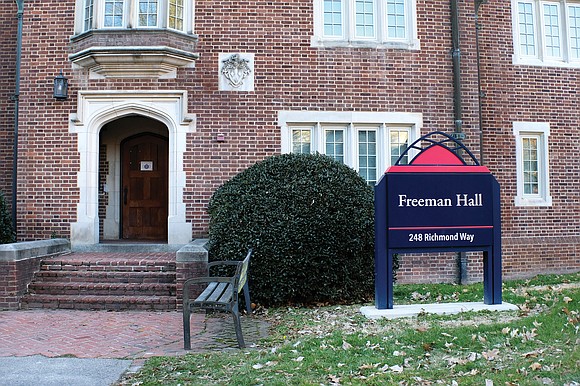Take them down
The UR Black Student Coalition is demanding the University of Richmond remove names of racists from two buildings on West End campus
Jeremy M. Lazarus | 3/11/2021, 6 p.m.

The University of Richmond is facing accusations of supporting white supremacy as the result of its plan to keep a building named for its slave-holding first president and another named for a newspaperman who championed segregation and Black oppression.
A newly formed coalition of Black students is spreading the charge in demanding the university remove the names of the Rev. Robert Ryland, a slave-owning minister and UR president, and writer Douglas Southall Freeman, an alumnus and former rector at the private institution, from campus buildings.
The uproar follows the recent announcement from Dr. Ronald A. Crutcher, the university’s first African-American president, that the names of both men will remain on the two buildings, with modifications to honor Black people.
For example, Freeman Hall, a dormitory, has been renamed Mitchell-Freeman Hall to honor John Mitchell Jr., the crusading Black editor of the Richmond Planet. Mr. Mitchell fought lynching and sought to uphold Black dignity that Mr. Freeman sought to eliminate in his opinion pieces for a white Richmond daily newspaper.
Mr. Mitchell’s descendants approve of adding his name to the building.
Also, instead of removing Rev. Ryland’s name from an undergraduate academic hall, Dr. Crutcher said the university plans to rename a new terrace at the building for one or more of the enslaved people whom Rev. Ryland owned and leased to the school to perform work.
In an Instagram statement issued March 4, the UR Black Student Coalition blasted the decision by Dr. Crutcher and the UR Board of Trustees as an example of the “institutional culture of justifying and upholding white supremacy” at the university.
“The choice to continue to uplift these violent racists implicitly devalues the lives of Black people and is further evidence of just how deeply ingrained white supremacy still is at UR,” the statement read.
Dr. Crutcher was aware that there might be pushback from retaining the Ryland and Freeman names. Students since 2019 have called on the university to remove the names. But Dr. Crutcher said keeping the names and linking them with Black people could help “spark conversations” about race.
The student group’s statement on an Instagram page called “Protect Our Web” also had a petition that has been gathering support from others, including faculty and administrators, calling for the names to be removed.
The Collegian, the campus student newspaper, helped spread the word in a story on Monday, noting that 495 people had signed the petition. By Tuesday, the number of signatures reportedly had grown to more than 550 people.
Echoing the theme of the Feb. 25-27 Richmond Free Press editorial condemning the UR approach, the group’s statement notes the university’s decision creates “a false equivalency” that suggests that those named are “all worthy of honor and respect when that is simply not the case concerning Ryland and Freeman.”
Students Shira Greer, an editor at The Collegian, and Simone Greer are credited with writing the statement as founding members. Other founders include Jesse Amankwaah, Kayla Corbin, Katiana Isaac, Jordyn Lofton and Kristen Starks.
The statement describes UR as a school that disregards the interests of Black students and concludes by stating that the university has until Thursday, April 1, to “release a plan to meet our demands in a reasonable timeframe.”
Along with removing the Ryland and Freeman names, the demands include having UR provide increased academic accommodation for students due to the pandemic and for having UR provide subsidies for off-campus mental health services to redress what the statement claims is disproportionate service to white students in the on-campus mental health operation.
If a plan is not issued by the deadline, the statement warns that Black seniors and other supportive seniors would “cease involvement with any university task forces, student organizations and fundraisers” and would not interact with the school after graduating.
The group also warned that undergraduates would follow suit if there was no plan released as of Thursday, April 15.
The university has not responded to the statement.






